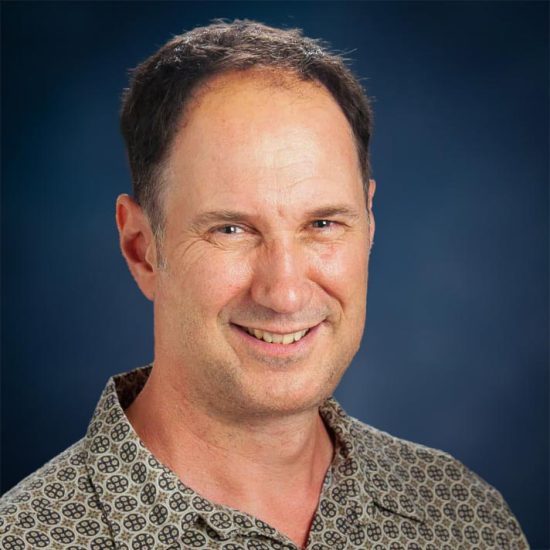I think the greatest advantage for students at East Texas A&M is the opportunity to participate in research labs.
Laurence Angel, Ph.D. Professor
- Faculty

At the age of 16, Lawrence Angel believed he would not need a higher education degree to make a living in the United Kingdom. Nonetheless, he found himself struggling to get by until he was hired at a photography shop where he became motivated to further his education. At the age of 25, Angel started his return to higher education, completing an environmental and life sciences access course which prepared him for studies in environmental chemistry with North American Studies at Sussex University. This set him on a path of learning, exploration and research that continues to this day. In his short time at East Texas A&M, Angel has contributed a great deal to the university, conducting research in instrumental analysis and high-performance computation modeling. He has also received several grants to continue his chemistry research.
A Conversation with Dr. Angel
What would you tell a student who is thinking about attending East Texas A&M?
I think the greatest advantage for students at East Texas A&M is the opportunity to participate in research labs. Students should be able to apply what they have learned in class to real-world problems. By gaining hands-on experience, students will fully understand the theories and the practicalities of chemistry. Employers prefer employees who have some applied experience. When a student is able to discuss research with others, they really stand out!
What draws you to your discipline?
When I began my studies, chemistry was a popular area of study. I minored in North American studies and majored in environmental science. I believe it should have been called environmental chemistry instead of science due to all the chemistry-related courses, though! My professor at Sussex helped me pursue my doctorate in instrumental physical analysis, which emphasized chemistry. I was able to tie in my environmental background by conducting atmospheric research, and with that emphasis, I was able to transfer to chemistry.
What has been your favorite course to teach?
From all the courses that I have taught, I enjoy teaching general chemistry the most, even though it doesn’t relate to my research. It’s very rewarding to teach a group of students. I also find that undergraduate courses give me the ability to have a bit more fun because I know the content by heart. It allows me to improvise instead of following a script.
Tell us about a project you are currently working on or recently completed.
I am currently in the process of using an instrumental technique in therapeutic metal lines. I am looking into health and remedies as some diseases in the body can break down and oxidize tissue. One of the treatments is to intravenously introduce a strong coagulation agent. Additional therapy is needed to help bind up the excess amount of metal lines, such as copper. The body will excrete the bound copper to decrease the amount of it present in the body. Another instrumental technique combines ion mobility and mass spectrometry by preparing peptides with copper to find out which peptides have the highest binding capability to a specific metal. My research group and I have been working with peptides for the last eight years because there is such a variety of them to test.
Tell us a little about yourself.
During my undergraduate work in the UK, I studied a year abroad in Stonybrook, Long Island. I was very excited to see a new country and have the opportunity to travel. It was a great experience! I went back to the UK and began my doctoral studies. My area of research had many connections with international research, especially in North America. I traveled several times to America and met many professors in similar fields. I realized that America had a lot of availability for post-doctoral research in chemistry. It had always been something I was interested in doing, so after completing my doctorate, I found a position at the University of Nevada.
Educational Background
- Ph.D., Chemistry, University of Sussex, 2000
- BSc, Environmental Science, University of Sussex, 1996
Academic Positions
- Professor, East Texas A&M University, 2019-Present
- Associate Professor, TAMUC( now ETAMU), 2013-2019
- Assistant Professor, University of Nevada, 2007-2013
- Assistant Research Professor, University of Nevada, 2003-2007
Research Funding
- $216,267, National Science Foundation, 2018-2021
- $291,600, U.S. Department of Energy Grant, 2010
- $310,000, National Science Foundation, 2008-2012
Awards and Honors
- Faculty Senate Recognition Award for Professional Excellence: “Fearless Investigation,” TAMUC( now ETAMU), 2017
- Provost Award: Research and Creative Activity, TAMUC( now ETAMU), 2011
- Outstanding Professor and Researcher EB-1 Visa Award, University of Nevada, 2006
- Ph.D. Phil. Research Award, Engineering and Physical Sciences Research Council, UK, 1996-1999
Professional Organizations
- American Society of Mass Spectrometry
- American Chemical Society
Selected Publications
Featured Courses
CHEM 340 Quantitative & Instrumental Analysis
CHEM 541 Advanced Analytical Chemistry
CHEM 441 Instrumental Analysis


